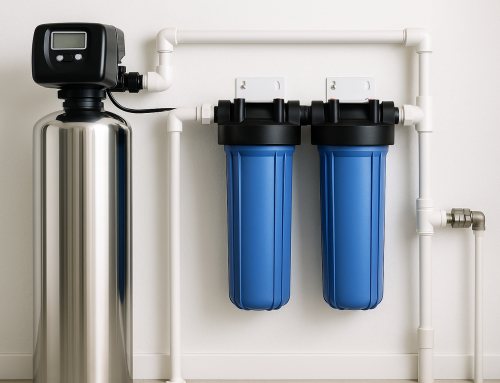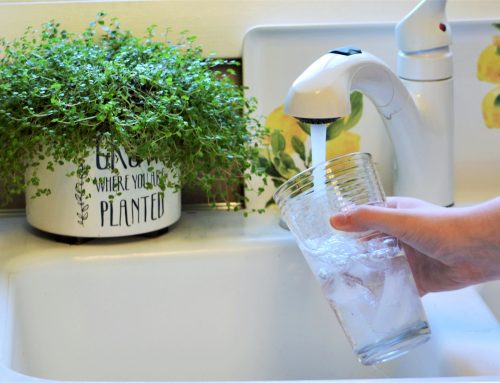Nearly 45% of drinking water samples in the United States contain at least one PFAS chemical, a concerning statistic that hits close to home for many Houston residents. These “forever chemicals,” along with chlorine, heavy metals, and other contaminants, can remain in water supplies long-term and pose potential health risks.
Because many contaminants are invisible and odorless, homeowners are often unaware of what’s flowing through their taps. This is why choosing the best whole house water filter system in Houston is one of the most effective ways to protect your home, your health, and your peace of mind.
This guide explains the benefits of whole house water filtration, the different systems available, and how to choose the right solution for your household.
Benefits of a Whole House Water Filter System
A whole house water filter doesn’t just improve drinking water. It treats all water entering your home, providing benefits at every faucet.
Healthier Water for Your Family
Contaminants such as chlorine, lead, volatile organic compounds (VOCs), and PFAS can have cumulative health effects over time. A whole house filtration system reduces or eliminates these substances, providing safer water for drinking, cooking, bathing, and brushing teeth.
Protection for Plumbing and Appliances
Houston water can be hard, containing high levels of calcium and magnesium. These minerals contribute to scale buildup in pipes, water heaters, dishwashers, and washing machines. Over time, scale reduces efficiency and leads to expensive repairs. A whole house water filter helps prevent mineral buildup, extending the life of your plumbing and appliances.
Improved Taste and Odor
Municipal water treatment often relies on chlorine and other disinfectants that affect the taste and smell of the water. A whole house filtration system removes these chemicals, delivering fresh, clean-tasting water from every tap. This improves not only drinking water but also the flavor of food and beverages prepared at home.
Convenience and Peace of Mind
With a whole house system, you don’t need multiple point-of-use filters. Every shower, faucet, and appliance benefits from filtered water, providing consistent quality throughout your home.
Types of Whole House Water Filter Systems
Understanding the different filtration technologies available is key to choosing the right system.
Sediment Filters
Sediment filters remove large particles such as sand, dirt, silt, and rust. These filters are typically installed as the first stage of a multi-stage system. By removing debris, sediment filters protect downstream filters and prevent clogging, improving overall system efficiency.
Carbon Filters
Carbon filters are highly effective at removing chlorine, VOCs, and chemicals that cause unpleasant taste and odor. Activated carbon works through adsorption, trapping contaminants on the surface of the carbon media. Carbon filtration is a core component of most whole house water filter systems.
Reverse Osmosis Systems
Reverse osmosis systems provide one of the highest levels of filtration available. They can remove up to 99% of contaminants, including lead, arsenic, fluoride, and nitrates. Reverse osmosis uses a semi-permeable membrane to separate contaminants from clean water. While extremely effective, these systems typically require higher upfront costs and ongoing maintenance.
UV Purification Systems
UV purification systems use ultraviolet light to destroy bacteria, viruses, and other microorganisms. These systems are especially useful for homes with well water or areas where microbial contamination is a concern. UV systems are often combined with other filters for complete protection.
Key Factors to Consider When Choosing a Whole House Water Filter
Water Quality Testing
The first step in choosing the best system is understanding your water. Professional water testing or a certified home test kit can identify specific contaminants such as chlorine, PFAS, heavy metals, or hardness. This information ensures your system is designed to target your exact water quality issues.
Flow Rate Requirements
Flow rate determines how much water the system can filter at one time. Larger households with multiple bathrooms need higher flow rates to maintain consistent water pressure. Smaller households may require less capacity, reducing overall system cost.
Filter Lifespan and Maintenance
Different systems have different maintenance needs. Some filters require frequent replacement, while others last several months or years. Choosing a system with long-lasting filters and simple maintenance can reduce both cost and inconvenience over time.
Upfront Cost vs. Long-Term Savings
While whole house water filters may require an initial investment, they often provide significant long-term savings by reducing bottled water purchases, lowering plumbing repair costs, and improving appliance efficiency.
Household-Specific Needs
Every home is different. Some households struggle with hard water, while others are more concerned about chlorine, lead, or PFAS. Selecting a customized solution ensures the best performance and results.
Installation and Maintenance Best Practices
Professional installation is highly recommended for whole house water filter systems. Proper installation ensures correct placement, optimal performance, and compliance with local plumbing codes.
Once installed, routine maintenance is essential. This includes replacing filters according to the manufacturer’s schedule and monitoring changes in water pressure, taste, or odor. Staying proactive helps maintain water quality and extends system lifespan.
Secure Your Home’s Water Quality
Choosing the right whole house water filter system is an investment in your health, comfort, and home. Clean water improves daily life while protecting plumbing, appliances, and your family from unseen contaminants.
At Custom Filtration Systems, we design custom-built whole house water filtration solutions tailored to the unique water conditions in Houston-area homes. Our focus on quality, efficiency, and affordability ensures reliable protection for every drop of water you use.
Schedule a free water test today and experience the difference a professionally designed whole house water filter system can make.






